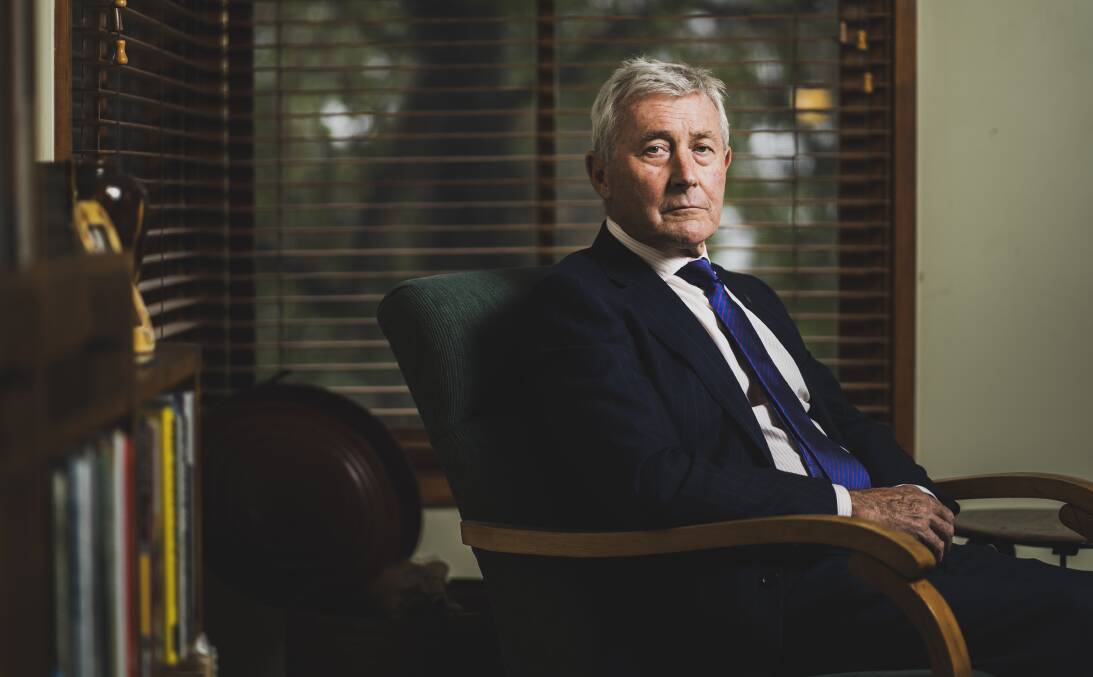
The federal Attorney-General's bid for an appeal to redact more parts of a judgment that ruled for an open trial of Bernard Collaery has been adjourned after three High Court judges questioned the application with one describing the case as being "fragmentation of a criminal proceedings at its worst" on Wednesday.
Attorney-General Michaelia Cash and her lawyers last December filed documents to the nation's highest court for special leave to appeal the publication of an ACT Court of Appeal judgment that overturned a prior decision to hold the trial largely behind closed doors.
In the application, the lawyers argue that information "likely to prejudice national security will be made public" unless the appeal is upheld and publication restricted.
They say open justice is of "undoubted importance", but national security considerations must be given "the greatest weight".
"Sometimes, as in this case, an appeal is the only way to prevent prejudice to national security."
During the High Court hearing of the long-running legal saga on Wednesday, Solicitor-General Dr Stephen Donaghue QC reiterated the case for national security information to be restricted.
He said it was not their submission for the entirety of the judgment to be redacted but only parts of it.
He argued that an ACT Supreme Court proceeding related to whether some evidence should be judge only needed to be determined before the issues with the appeal judgment could be revisited.
Chief Justice Susan Kiefel questioned whether the application for special leave was "more or less an application for stay" to which Dr Donaghue again outlined his submission about the ACT Supreme Court proceeding needing to occur first.
The application and other court hearings related to the case led Justice Michelle Gordon to describe it as being "fragmentation of a criminal proceedings at its worst".
Justice James Edelman questioned whether "this court should perform the same exercise [about redactions] probably for a third time".
He also asked if the error was that the ACT Chief Justice "did not make the order that you sought" rather than in her reasons related to the Court of Appeal's decision.
Dr Donaghue was told he could choose for the application to be rejected or delayed - until the ACT Supreme Court matter is resolved first - to which he chose the latter.
Collaery, a Canberra lawyer and former territory politician, is set to stand trial in the Supreme Court accused of revealing confidential information about the Australian government spying on East Timor during negotiations about lucrative oil and gas reserves nearly 20 years ago.
He is pleading not guilty to four charges alleging he broke the law by sharing via media interviews protected information about the Australian Secret Intelligence Service.
He is also fighting one count of conspiring with his former client, the ex-spy known as Witness K, to unlawfully communicate such information to the government of East Timor.
Related: Secret evidence to be allowed in Collaery case
His trial was set to be conducted largely in secrecy due to the Attorney-General's use of the National Security Information Act to address national security concerns, but the ACT Court of Appeal last October ruled for an open trial.
In a one-page summary, the three judges of that court said they doubted a significant risk of prejudice to national security would materialise if certain things the Attorney-General wanted to keep hidden were disclosed to the public during the trial.
Chief Justice Helen Murrell was due to publish that court's full judgment with some redactions in November before one of the lawyers for the Attorney-General flagged the possibility of a High Court appeal before filing the application.

The Alliance Against Political Prosecution group gathered outside court to support Collaery on Wednesday.
Co-convenor Kathryn Kelly said the secrecy involved "was unheard of in Australian courts".
"That's a great danger for our system of open justice," Ms Kelly said.
"As the appeal court said [in its summary], this is not the way the Australian courts should be operating.
"Open court is a very high priority for our legal system and I certainly agree with that."







